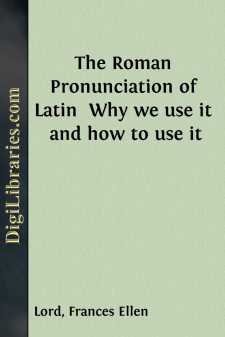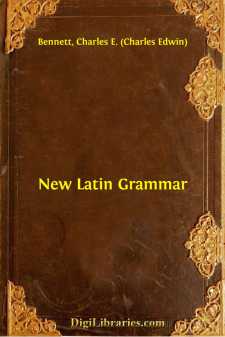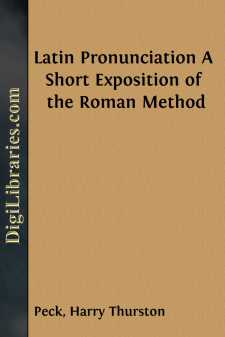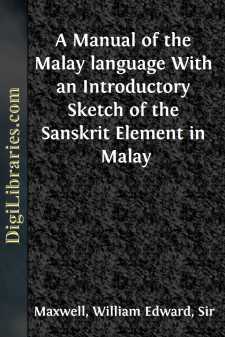Language Arts & Disciplines
- Alphabet 2
- Authorship 5
- Composition & Creative Writing 2
- Etymology 4
- General 30
- Grammar
- Journalism 3
- Phonetics & Phonics 1
- Public Speaking 1
- Readers 2
- Reading Skills 1
- Rhetoric 8
- Semantics 1
- Spelling 2
- Study & Teaching 3
- Translating & Interpreting 2
- Vocabulary 5
Grammar Books
Sort by:
INTRODUCTION. The utility of a Grammar of the Scottish Gaelic will be variously appreciated. Some will be disposed to deride the vain endeavour to restore vigour to a decaying superannuated language. Those who reckon the extirpation of the Gaelic a necessary step toward that general extension of the English which they deem essential to the political interest of the Highlands, will condemn every project...
more...
by:
John Summerfield
ADVERTISEMENT. The following pages were written as an exercise for my leisure hours, while attending the Oneida Conference Seminary during the past winter. As it is the first attempt that, to my knowledge, has ever been made to reduce the Chippeway language to any system, it cannot be expected to be otherwise than imperfect, and perhaps may hereafter be found to be, in some respects, erroneous. It is,...
more...
INTRODUCTION. The argument brought against the ‘Roman pronunciation’ of Latin is twofold: the impossibility of perfect theoretical knowledge, and the difficulty of practical attainment. If to know the main features of the classic pronunciation of Latin were impossible, then our obvious course would be to refuse the attempt; to regard the language as in reality dead, and to make no pretence of...
more...
by:
Giles Du Wes
FOR IMPLORATION OF GRACE. Grace of God that I love so mocheG race de Dieu que jayme tant I your requier ryght humblyI e uous requier treshumblement the gift of love without any furtherL e don damour sans plus auant of it to make any refuceE n faire aulcun refusement If ye do fynde in any wiseS e uous trouués aulcunement of me service, but in trouthD e moy seruice quen loyaulté I gyve you leve...
more...
PART I. SOUNDS, ACCENT, QUANTITY. THE ALPHABET. 1. The Latin Alphabet is the same as the English, except that the Latin has no w. 1. K occurs only in Kalendae and a few other words; y and z were introduced from the Greek about 50 B.C., and occur only in foreign words—chiefly Greek. 2. With the Romans, who regularly employed only capitals, I served both as vowel and consonant; so also V. For us,...
more...
INTRODUCTORY. THIS short manual is primarily intended for those who, being interested in the study of Latin, have accepted the Roman method of pronunciation upon the authority of the Grammars, but have either not been able to command the time to make themselves familiar with the arguments upon which this system is based, or have been repelled by the technicalities employed in treating the question from...
more...
The language which I have endeavoured to illustrate in the following pages is the Malay of the British Settlements in the Straits of Malacca, some knowledge of which I have had the opportunity of acquiring during sixteen years’ service in Penang, Province Wellesley, Malacca, Singapore, and Perak. Dialectical peculiarities are so abundant in Malay that it is impossible to teach the colloquial language...
more...
by:
Henry Bate
Usage and Custom are the Rules and Measures of every Language, and the Rules of Grammar have nothing more to do, than to teach it. The Grammar is to be fashioned from the particular Language, it treats of, and not the Language from the Grammar. For want of following this regular Plan, our Modern GRAMMARIANS have introduced the Grammar Rules of other Languages into their own; as if all Language was...
more...
by:
Samuel Kirkham
LECTURE I TO THE YOUNG LEARNER. You are about to enter upon one of the most useful, and, when rightly pursued, one of the most interesting studies in the whole circle of science. If, however, you, like many a misguided youth, are under the impression that the study of grammar is dry and irksome, and a matter of little consequence, I trust I shall succeed in removing from your mind, all such false...
more...
by:
Goold Brown
CHAPTER I. OF THE SCIENCE OF GRAMMAR. "Hæc de Grammatica quam brevissime potui: non ut omnia dicerem sectatus, (quod infinitum erat,) sed ut maxima necessaria."—QUINTILIAN. De Inst. Orat., Lib. i, Cap. x. 1. Language, in the proper sense of the term, is peculiar to man; so that, without a miraculous assumption of human powers, none but human beings can make words the vehicle of thought. An...
more...











